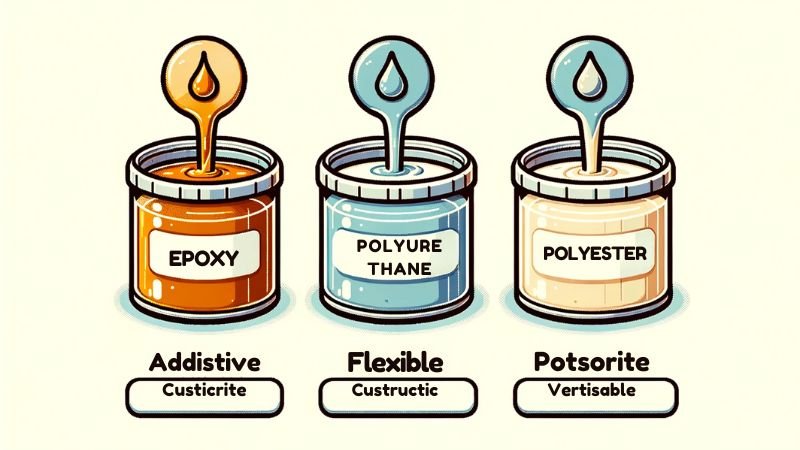Poliestera sveķi ir polimēru jomas stūrakmens, kas ir slavens ar savu daudzpusību un plaši izplatīto pielietojumu.
Kas ir poliestera sveķi?
Poliestera sveķi pēc būtības ir polimērs - atkārtotu molekulāro vienību ķēde. Bet ar ko tas izceļas pārpildītajā polimēru pasaulē?
Definīcija un pamata ķīmija
Poliestera sveķi ir nepiesātināti sintētiskie sveķi, kas veidojas divvērtīgu organisko skābju un daudzvērtīgo spirtu reakcijā. Tie parasti ir viskozi, gaišas krāsas šķidrumi. Viņu ķīmija ir aizraujoša, ietverot molekulu deju, kurā skābes un spirti saplūst, veidojot esteru saites.

Salīdzinājums ar citiem sveķiem
Lai gan ir pieejami neskaitāmi sveķi, katrs ar savām unikālajām īpašībām, poliestera sveķiem ir sava vieta to atšķirīgo īpašību dēļ. Piemēram:
- Epoksīda sveķi: Pazīstams ar izcilām adhezīvām īpašībām un izturību pret ķīmiskām vielām. Tomēr tas parasti ir dārgāks nekā poliesters.
- Poliuretāna sveķi: Piedāvā elastību un tiek izmantots lietojumos, kur būtiska ir augsta nodilumizturība. Tomēr tā jutīgums pret mitrumu cietēšanas laikā var būt ierobežojums.
Turpretim poliestera sveķi bieži tiek doti priekšroka to rentabilitātes, ērtas lietošanas un pielāgojamības dēļ dažādiem lietojumiem.
Poliestera sveķu veidi
Ne visi poliestera sveķi ir vienādi. Atkarībā no ķīmiskā pamata mēs tos klasificējam vairākos veidos, katram no kuriem ir unikāli atribūti, kas pielāgoti konkrētiem lietojumiem.
Ortoftala sveķi (vispārēja pielietojuma sveķi)
Tā izcelsme ir no ftalskābes anhidrīda, un tas ir tirgū visizplatītākais poliestera sveķu veids. Tas ir jūsu universālais piedāvājums — par saprātīgu cenu un daudzpusīgs.
Īpašības:
- Labas mehāniskās īpašības
- Atbilstoša izturība pret ūdeni un dažādām ķīmiskām vielām
Tipiski pielietojumi:
- Izmanto stikla šķiedras laminātu ražošanā, piemēram, vannās, laivās un mazās automašīnu daļās.
Izoftaliskie sveķi
Šie sveķi, kas iegūti no izoftalskābes, nodrošina uzlabotu veiktspēju salīdzinājumā ar ortoftalisko brāli.
Īpašības:
- Izcila ūdens izturība
- Uzlabota izturība pret koroziju pret dažādām ķīmiskām vielām
Tipiski pielietojumi:
- Ideāli piemērots jūras videi, piemēram, laivu korpusiem, kuriem ir jāiztur pastāvīga ūdens iedarbība.
- Izmanto rūpnieciskos lietojumos, kur ķīmiskā izturība ir prioritāte.
Diciklopentadiēna (DCPD) sveķi
DCPD ir ligroīna krekinga blakusprodukts. Iestrādājot poliestera sveķos, tas piedāvā dažas intriģējošas priekšrocības.
Īpašības:
- Zema saraušanās
- Uzlabota stingrība un elastība
Tipiski pielietojumi:
- Automobiļu daļas, kur gluda apdare un augsta triecienizturība ir vissvarīgākā.
- Transportlīdzekļu virsbūves paneļi, pateicoties to augstas kvalitātes virsmas apdarei.

Poliestera sveķu īpašības
Lai patiesi novērtētu poliestera sveķu daudzpusību, ir jāiedziļinās tā raksturīgajās īpašībās. Šīs īpašības ne tikai izceļ to, bet arī nosaka tā piemērotību dažādiem lietojumiem.
Mehāniskās īpašības
- Izturība: Poliestera sveķiem piemīt slavējama stiepes, lieces un spiedes izturība, padarot tos ideāli piemērotus konstrukcijām.
- Elastīgums: Lai gan tie nav viselastīgākie no sveķiem, tie nodrošina pietiekami daudz, lai novērstu trauslumu lielākajā daļā to lietojumu.
- Cietība: Sacietēšanas laikā poliestera sveķi veido cietu virsmu, ko var vēl vairāk pastiprināt ar piedevām un šķiedrām.
Ķīmiskā izturība
- Ģenerālis: Poliestera sveķi, īpaši izoftāliskie varianti, iztur plašu ķīmisko vielu spektru, sākot no vājām skābēm līdz bāzēm.
- Ūdensizturība: Viens no iemesliem to popularitātei jūrniecībā, poliestera sveķi demonstrē labu ūdensizturību, īpaši, ja tie ir pareizi formulēti.
Izturība un kalpošanas laiks
- UV stabilitāte: Lai gan poliestera sveķi pēc būtības nav tie UV stabilākie, tos var modificēt ar piedevām, lai tie izturētu ilgstošu saules iedarbību.
- Nolietojums: Ņemot vērā to mehānisko izturību, poliestera sveķi iztur ikdienas lietošanas stingrību, kā rezultātā produkti ir ilgstoši.
Vienkārša lietošana un daudzpusība
- Sacietēšana: Poliestera sveķus var sacietēt istabas temperatūrā, izmantojot tādus katalizatorus kā MEKP (metiletilketona peroksīds).
- Adhēzija: Tie labi pielīp pie dažādām virsmām, novēršot nepieciešamību pēc plašas virsmas sagatavošanas.
- Daudzpusība: to spēja kombinēt ar pildvielām, pigmentiem un citām piedevām padara tos pielāgojamus daudziem lietojumiem.

Galvenās lietojumprogrammas
Poliestera sveķu daudzpusīgās īpašības padara tos neaizstājamus dažādās nozarēs. No jūras kuģiem, kas kursē pa okeāniem, līdz pašām automašīnām, ar kurām mēs braucam, tā klātbūtne ir visuresoša.
Jūras rūpniecība
- Laivu korpusi: Pateicoties ūdens un ķīmisko vielu izturībai, poliestera sveķi ir galvenā izvēle laivu korpusu izgatavošanai, nodrošinot, ka tie paliek necaurlaidīgi pret pastāvīgu ūdens uzbrukumu.
- Ieklāšana & Sastāvdaļas: Ārpus korpusa citās laivas daļās, piemēram, klājos, mastos un iekštelpās, bieži tiek izmantoti poliestera sveķi, jo tie ir izturīgi un viegli apkopjami.
Automašīna
- Ķermeņa pildvielas: Vai esat kādreiz domājuši par špaktelei līdzīgu vielu, ko izmanto, lai izlīdzinātu iespiedumus transportlīdzekļos? Bieži vien tas ir poliestera sveķu un pildvielu maisījums, kas tiek novērtēts par vieglu uzklāšanu un slīpēšanu.
- Lamināti & Paneļi: Daudzu automašīnu spīdīgais, gludais ārpuses spīdums ir saistīts ar stikla šķiedras slāņiem ar poliestera sveķiem.
Būvniecība
- Paneļi & Apšuvums: Ēkās, īpaši komerciālās, var izmantot poliestera sveķu paneļus gan estētikas, gan izturības dēļ.
- Vannas istabas aprīkojums: Izturīgo, taču stilīgo vannu, izlietņu un dušas kabīņu, kas bieži ir izgatavotas no stiklplasta, forma un funkcija ir atkarīga no poliestera sveķiem.
Māksla & Amatniecība
- Skulptūras & Figūriņas: Mākslinieki, veidojot skulptūras, bieži pievēršas poliestera sveķiem, novērtējot to formējamību un apdari.
- Rotaslietas: Sveķu juvelierizstrādājumu tendence paredz, ka amatnieki objektus un pigmentus iestrādā caurspīdīgos poliestera sveķos, radot valdzinošus gabalus.
Priekšrocības un trūkumi
Tāpat kā jebkurš materiāls, poliestera sveķi piedāvā priekšrocības un ierobežojumus. To atzīšana var palīdzēt pieņemt apzinātus lēmumus tās piemērošanā.
Priekšrocības
- Rentabilitāte: Viens no galvenajiem iemesliem, kāpēc tas ir plaši izplatīts, poliestera sveķi piedāvā labu veiktspējas līdzsvaru par pieņemamu cenu.
- Vienkārša lietošana: Tā spēju sacietēt istabas temperatūrā un vienkāršas sajaukšanas procedūras, tas ir lietotājam draudzīgs, īpaši iesācējiem.
- Pielāgošanās spēja: Poliestera sveķu savietojamība ar dažādām piedevām, pildvielām un šķiedrām ļauj tiem apmierināt daudzas ar lietojumu saistītas prasības.
- Izturība: Tā raksturīgā izturība un izturība pret daudziem vides faktoriem nozīmē, ka izstrādājumiem, kas izgatavoti no poliestera sveķiem, ir ilgs kalpošanas laiks.
- Laba Adhēzija: Tā spēja labi savienoties ar daudzām virsmām novērš nepieciešamību pēc sarežģītas virsmas sagatavošanas.
Trūkumi
- Trauslums: Salīdzinot ar dažiem citiem sveķiem, īpaši tad, ja tie nav pastiprināti, poliesters var būt vairāk pakļauts plaisāšanai slodzes ietekmē.
- UV jutība: Ilgstoša saules gaismas iedarbība var noārdīt poliestera sveķus, ja vien tie nav modificēti ar UV stabilizatoriem.
- Zemāka karstumizturība: Salīdzinot ar tādiem materiāliem kā epoksīdsveķi, poliestera sveķiem ir zemāks siltuma izturības slieksnis.
- Saraušanās: Sacietēšanas procesa laikā poliestera sveķi var nedaudz sarauties, kas var radīt bažas precīzos lietojumos.
- Smarža: Konservēšanas procesa laikā raksturīgā smarža dažiem var būt nepatīkama, īpaši slēgtās telpās.

Ietekme uz vidi un ilgtspējība
Laikmetā, ko arvien vairāk nosaka vides apziņa, ļoti svarīgi ir izprast ikdienā lietojamo materiālu ekoloģisko pēdu. Lai gan poliestera sveķi ir noderīgi daudzās nozarēs, tiem ir jāpievērš uzmanība vides apsvērumiem.
Rūpes par vidi
- Nav bioloģiski noārdāms: Tāpat kā daudzi sintētiskie polimēri, arī poliestera sveķi vidē viegli nesadalās. Tas rada ilgstošus atkritumus, jo īpaši tad, ja izstrādājumi sasniedz to kalpošanas laika beigas.
- Ražošanas emisijas: Poliestera sveķu ražošana ietver ķīmiskus procesus, kas var izdalīt piesārņotājus gaisā un ūdenī.
- Gaistošie organiskie savienojumi (GOS): Cietināšanas procesa laikā daži poliestera sveķu sastāvi var izdalīt GOS, kas veicina gaisa piesārņojumu un var būt kaitīgi slēgtās telpās.
Soļi ceļā uz ilgtspējību
- Pārstrādes iniciatīvas: tiek veikti centieni pārstrādāt no poliestera sveķiem izgatavotus produktus, lai nodrošinātu, ka tie nenonāk poligonos. Lai gan pastāv izaicinājumi, tehnoloģiju sasniegumi ir daudzsološi.
- Sveķi uz bioloģiskas bāzes: Pētnieki pēta sveķus, kas iegūti no atjaunojamiem resursiem kā alternatīvas tradicionālajiem uz naftas bāzes izgatavotajiem poliestera sveķiem.
- GOS emisiju samazināšana: Mūsdienu formulu un piedevu mērķis ir samazināt GOS izdalīšanos cietēšanas procesā, mazinot vides un veselības problēmas.
- Atbildīga ražošana: Uzņēmumi ievieš tīrākas ražošanas metodes, samazina emisijas un koncentrējas uz ilgtspējīgu izejvielu ieguvi.
Nākotnes tendences
Kamēr mēs virzāmies pa strauji mainīgo pasauli, poliestera sveķi ir gatavi ceļot līdzās, pielāgojoties un radot jauninājumus. Šeit ir sniegts ieskats par šī daudzpusīgā materiāla apvārsni.
Tehnoloģiskie sasniegumi
- Nanotehnoloģijas: Nano pildvielu iekļaušana poliestera sveķos var ievērojami uzlabot to īpašības, sākot no mehāniskās izturības līdz UV izturībai.
- Gudri materiāli: Iedomājieties laivas korpusu, kas pats sadzīst nelielas skrambas vai automobiļu paneļus, kas maina krāsu atkarībā no temperatūras. Poliestera sveķu integrācija ar viedajām piedevām to var padarīt par realitāti.
Uzsvars uz vidi
- Zaļš poliesters: Virzība uz videi draudzīgām alternatīvām izraisīs bioloģiski ražotu poliestera sveķu plašāku ieviešanu, samazinot atkarību no fosilā kurināmā.
- Aprites ekonomika: Pastiprināsies centieni izveidot slēgta cikla sistēmu poliestera sveķu izstrādājumiem, veicinot atkārtotu izmantošanu un pārstrādi, nevis utilizāciju.
Plašāka piemērošanas joma
- Medicīnas: Pateicoties bioloģiskās saderības attīstībai, mēs varam redzēt poliestera sveķus medicīniskos lietojumos, sākot no protezēšanas līdz medicīnas iekārtu korpusam.
- Kosmoss un aviācija: Attīstoties pētniecībai, poliestera sveķu kompozītmateriāli var tikt pielietoti prasīgajās kosmosa un kosmosa izpētes jomās.
Sadarbības pētījumi
- Nozares un akadēmisko aprindu partnerībasSadarbība starp nozarēm un akadēmiskajām iestādēm paātrinās pētniecību, virzot inovācijas poliestera sveķu lietojumos un formulējumos.
Secinājums
Poliestera sveķi, materiāls, kas ir nemanāmi ieausts dažādu nozaru audumos, liecina par cilvēka atjautību un pielāgošanās spēju. No tās pamatķīmijas līdz plašām pielietojumam, tās stāsts ir daudzpusīgs un evolūcija.
Lai gan tas nav bez problēmām, jo īpaši vides ilgtspējības jomā, nākotne šķiet gaiša. Tuvojoties tehnoloģiskajiem sasniegumiem, apvienojumā ar pastiprinātu uzsvaru uz videi draudzīgu praksi, poliestera sveķiem ir paredzēts attīstīties tā, lai tie veicinātu to lietderību, vienlaikus saskaņojot ar globālajiem ilgtspējības mērķiem.





